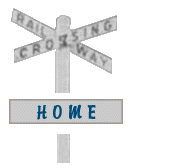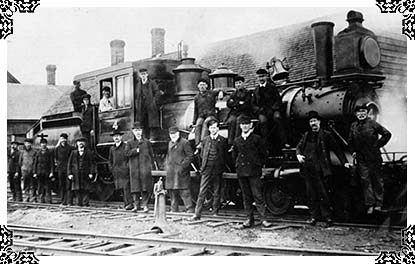








While the trains brought prosperity and growth to Kensington, they also sometimes brought disaster -- and even death. Such was the case on August 25, 1900, when a devastating crash in the outlying area took the life of Engineer David Sabey Pound.
The run that would be David Pound's last started out from Charlottetown at 4:10 p.m. It was the tail-end of a stifling Saturday in late August, and being a weekend, the train was crammed with passengers. Pound did not normally head out on Saturdays, because his seniority allowed him to spend every Sunday home with his family. Present-day family members assume that he was going to be relieved at the Kensington station. He had close relatives in town and he probably planned to spend the night with them, before returning to Charlottetown by horse the next day. But Pound never made it into Kensington.
Up to the Freetown station, everything was proceeding like clockwork, and the hot heavy air was the only potential cause for discomfort. But then without any warning, sixty feet before the bridge crossing of Johnston's Mill Stream near Blueshank, the number five train hit a bad rail and was sent careening off the tracks into the ditch. The train travelled about thirty feet on its side, ploughing up massive amounts of earth as it went. The cab of the engine caved in like cardboard and the three of the six derailed cars were demolished. Fortunately, the rear passenger coach remained partly on the rails and most were only shaken up and frightened. The wreck could have been much worse, but David Pound had kept his hand on the throttle and cut off the steam almost immediately after the train left the tracks.
In the Monday morning papers, the consensus was the derailment was caused by a 'sun kink,' a bulge in the rails brought about by the oppressive heat of the afternoon. When tracks are laid, a one-inch gap is left beneath them to allow for expansion. However, when too much of this kind of distention occurs, the rail has nowhere left to expand and buckles upward. The consequences for a train speeding down the track were obvious and grim.
While the passengers escaped unscathed, the crew was not so lucky. Brakeman Halfpenny had been checking a rope on top of the train and was deflected off the side of another boxcar and out into the field. Conductor Kelly had a finger completely smashed while in the baggage car. But these injuries were only minor compared to what Pound had suffered. He walked away from the cab and, at first, it did not seem as if he was injured at all. But he sank to the ground within a few steps, and as Fireman MacElman ran to his side, he whispered agonizingly, "I'm scalded to death." After examining his side, it was found that he had three broken ribs and had received horrible steam burns from his shoulder down to his feet. He might have saved lives by keeping his hand on the throttle until the end, but he had sacrificed his own.
Passengers and crew tried to tend to his injuries as best they could, with ladies even tearing strips off their dresses to bind his wounds. Local legend says Pound was borne from the wreck on the back of a door, and there being no hospital, he was removed to the Kensington train station. His wife and a son, as well as Dr. James Warburton, were rushed to Kensington on an emergency train, and his brother William sped in by carriage from Margate. Engineer Pound knew he was dying and breathed his last the next afternoon, after naming several of his railway partners as his pallbearers. Despite having the best treatment available for the day, there was no possible way to replenish the massive liquid loss his body had undergone, and there were no antibiotics to fight infection. One of Pound's young sons had been away visiting and, returning to Charlottetown by boat, he found out about his father's death when he overheard someone commenting about why the rail flag was at half-mast. The young boy broke into uncontrollable tears.
As David Pound's body was being returned to Charlottetown by rail, one of the most severe thunder and lightning storms in Island memory began to rage, breaking the heat of the preceding days. Churches and houses were burned from Tignish to Souris. It was almost as if the sky was playing out the violence and horrible din of the crash which had deprived the brave engineer of his life.
Look in our gallery for pictures of other Island train wrecks.

